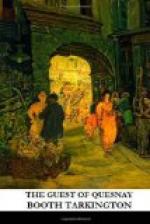My old friend, George Ward, and I had met for our aperitif at the Terrace Larue, by the Madeleine, when the white automobile came snaking its way craftily through the traffic. Turning in to pass a victoria on the wrong side, it was forced down to a snail’s pace near the curb and not far from our table, where it paused, checked by a blockade at the next corner. I heard Ward utter a half-suppressed guttural of what I took to be amazement, and I did not wonder.
The face of the man in the tonneau detached him to the spectator’s gaze and singled him out of the concourse with an effect almost ludicrous in its incongruity. The hair was dark, lustrous and thick, the forehead broad and finely modelled, and certain other ruinous vestiges of youth and good looks remained; but whatever the features might once have shown of honour, worth, or kindly semblance had disappeared beyond all tracing in a blurred distortion. The lids of one eye were discoloured and swollen almost together; other traces of a recent battering were not lacking, nor was cosmetic evidence of a heroic struggle, on the part of some valet of infinite pains, to efface them. The nose lost outline in the discolorations of the puffed cheeks; the chin, tufted with a small imperial, trembled beneath a sagging, gray lip. And that this bruised and dissipated mask should suffer the final grotesque touch, it was decorated with the moustache of a coquettish marquis, the ends waxed and exquisitely elevated.
The figure was fat, but loose and sprawling, seemingly without the will to hold itself together; in truth the man appeared to be almost in a semi-stupor, and, contrasted with this powdered Silenus, even the woman beside him gained something of human dignity. At least, she was thoroughly alive, bold, predatory, and in spite of the gross embon-point that threatened her, still savagely graceful. A purple veil, dotted with gold, floated about her hat, from which green-dyed ostrich plumes cascaded down across a cheek enamelled dead white. Her hair was plastered in blue-black waves, parted low on the forehead; her lips were splashed a startling carmine, the eyelids painted blue; and, from between lashes gummed into little spikes of blacking, she favoured her companion with a glance of carelessly simulated tenderness,—a look all too vividly suggesting the ghastly calculations of a cook wheedling a chicken nearer the kitchen door. But I felt no great pity for the victim.
“Who is it?” I asked, staring at the man in the automobile and not turning toward Ward.
“That is Mariana—’la bella Mariana la Mursiana,’” George answered; “— one of those women who come to Paris from the tropics to form themselves on the legend of the one great famous and infamous Spanish dancer who died a long while ago. Mariana did very well for a time. I’ve heard that the revolutionary societies intend striking medals in her honour: she’s done worse things to royalty than all the anarchists in Europe! But her great days are over: she’s getting old; that type goes to pieces quickly, once it begins to slump, and it won’t be long before she’ll be horribly fat, though she’s still a graceful dancer. She danced at the Folie Rouge last week.”




